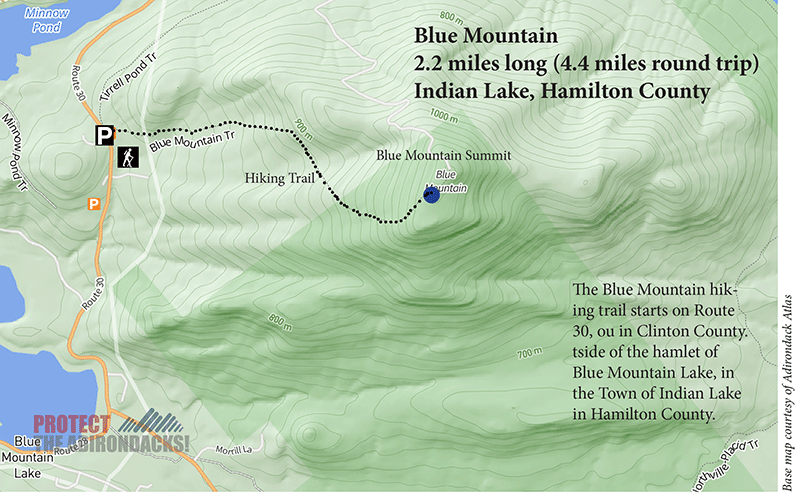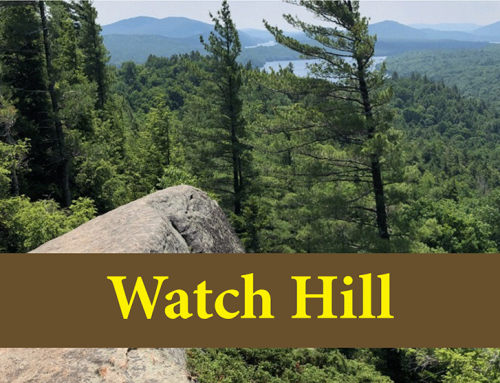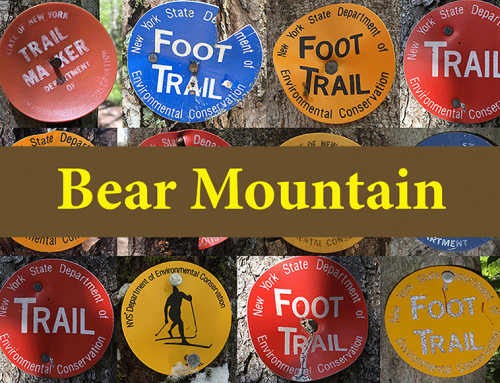Blue Mountain is a very steep and challenging 2.2-mile hike to a large, wide open summit with a firetower that provides a 360-degree view.
Blue Mountain
2.2 miles (4.4 miles round-trip)
Indian Lake, Hamilton County
Blue Mountain Wild Forest
Hiking, Snowshoeing
Level of Difficulty: Challenging
Hike Up Blue Mountain
Blue Mountain is a 2.2-mile hike in Blue Mountain Lake in the central Adirondacks. The trail is on conservation easement and public Forest Preserve in the Blue Mountain Wild Forest area. The hike is a steady climb, ascending 1,550 feet over a distance of 2.2 miles with many fairly steep and rocky stretches. The trail includes extensive boardwalks, long stretches on bare bedrock, and serene passages through spruce stands all lead to a beautiful summit with a grand view from a firetower.
The parking lot and trailhead for this hike are off of State Route 30, just north of the Adirondack Experience, outside of the Blue Mountain Lake hamlet in the Town of Indian Lake in Hamilton County. There is a large parking lot. Blue Mountain is a popular hike, so expect to see other people on this hike.
The Blue Mountain Hiking Trail
The trail begins just to the right of the trail register at the rear of the parking area and follows red trail markers. The trail is heavily worn and eroded, but easy to follow. After the trail traverses a few hundred yards through a young hardwood forest, the trail reaches a junction where hikers should turn right onto an old road that narrows to a foot trail and soon twists between large boulders, jagged rocks, and tree roots.
Soon a long stretch of boardwalks that span muddy areas leads to a wide and rocky stream. Once the trail passes the stream, the ground softens for a few hundred yards before the rocky and steep sections. Tree roots help to hold the soil on the trail in these segments, but the trail is heavily eroded. The trail then follows a welcome descent down boardwalks and rocks after the long, steady first climb.
After a second stream crossing, the trail passes over numerous stretches of exposed bedrock where topsoil has been worn away, revealing roots and small mossy banks on either side. These areas can be very slippery. Steep sections follow steep sections for about 0.75 of a mile.
Soon spruce trees dominate the forest surrounding the trail, and chattering red squirrels welcome hikers into the last stretch. The trail undulates over large rocks and cuts through dense stands of spruce. Views of distant mountains and ridges and Blue Mountain Lake’s blue waters can be seen through the trees.
The Blue Mountain Summit
The summit is fairly developed with large cement helicopter landing pads, a massive cell phones tower, the gravel entrance of an access road, an emergency communications tower, observers cabin, and the fire tower. Despite the many built areas, the view from the newly renovated firetower is wonderful. Climbing above the treeline on the different levels of the firetower, hikers will notice the line of lakes to the southwest from Raquette Lake in the distance to the nearby Blue Mountain Lake. High Peaks stand in the distance to the east and Wakely Mountain, Blue Ridge, and Snowy Mountain are arrayed to the southwest. Tirrell Pond and Tirrell Pond Mountain are clearly viewed in the valley below to the east.
The hike down follows the same route as the hike up.
Click here to download a map and trail directions for Blue Mountain.
When You Hike Make Sure to Practice “Leave No Trace” to be Prepared and to Protect the Forest Preserve
Please follow “carry in, carry out” rules for all trash and follow other Leave No Trace principles when hiking in the public Forest Preserve and other wild areas. The seven Leave No Trace principles are: 1) Plan ahead and prepare; 2) Stay on hiking trails and camp at designated areas; 3) Dispose of human waste and trash properly; 4) Leave what you find; 5) Minimize campfires; 6) Respect wildlife; 7) Respect other hikers.
Educated hikers do not damage the environment. Prepared hikers do not need search and rescue unless injured.
Winter Use: Blue Mountain is a popular mountain for snowshoeing in the winter.
Click here to become a member of Protect the Adirondacks.






















